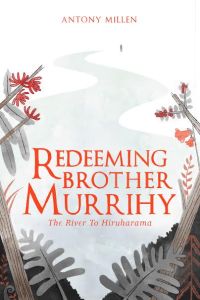Twenty years ago, Antony Millen moved to New Zealand from Nova Scotia with his wife and children, where the small town of Taumarunui has been their home. Millen has taught at two schools, starting at St Patrick’s Primary School and now works as head of English at Taumarunui High School.
In 2013, he published his first novel, Redeeming Brother Murrihy, and followed this with Te Kauhanga (2014) and the futuristic The Chain (2015). His short story “Aukati” was published in the literary journal Landfall (Issue 231).
Millen has been writing an intriguing series at antonymillen.com, the “Weekend Name Drop,” about creative people he’s encountered (including Jesus). He also is an online fan of the Montreal Canadiens games.
Oh My Canada by Antony Millen
Growing up, I would have been voted least likely of my siblings to move from our home of Pictou County, Nova Scotia. My brother would have been voted most likely. The furthest he shifted was to Halifax before quickly returning. My sister spent three years in Ontario before re-settling a mere hour from our parents.
When I was 25, I moved to New Zealand as a teacher, a young husband and a father.
When I was 35, I made my first trip back, on my own, to sort out belongings we’d left behind. My head was filled with romantic notions about my homeland, my family, old friendships and the mythos of the place I’d grown in my imagination.
Now 45, I’ve recently returned from just my second trip home. This time, I travelled with my daughter. She was 16 months old when we moved her away from our family and culture. At 21, she met her uncles and aunts and her five first cousins, born while we’ve been living overseas. I also returned with the eyes of a burgeoning writer, eager to step back from my romantic notions and experience home the way it is, not the way it was or the way I wish it was.
Of course, we encountered the Canada I expected: Tim Horton’s at the Pierre Elliott Trudeau International Airport in Montreal; poutine at an Irving restaurant; Canada winning the World Cup of Hockey and the Blue Jays bowing out of the playoffs for the second year in a row; Citadel Hill in Halifax; the pumpkin people of Kentville; Thanksgiving with family and friends. My daughter observed how many Canadian flags were stationed in private properties, a practice not nearly as prevalent in New Zealand.
At the same time, Nova Scotia is not Canada, in the sense that it is not made rich with tar sands; it is not populated with sons of former prime ministers sporting charismatic French accents; it is not brimming with multicultural diversity, though the famed Syrian chocolate-makers did make an appearance at the New Glasgow market while I was there.
I tell my students how fortunate they are to live among multiple cultures even in our little town of Taumarunui. I tell them everyone looks like me where I’m from.
In this sense, Nova Scotia has not changed.
But Pictou County, my Canada, has changed.
I left at a time when the decline was starting, and I witnessed evidence of the same trends occurring today. Teaching jobs were scarce in 1997 and that was due to falling rolls and those were due to a reducing population and that was due to families moving away and that was due to scarcity of other employment and that was due to the closures and restrictions on primary industries such as mining and fisheries. Such is my understanding of economics.
Amalgamation was selected as the solution. After I left, schoolboards joined together, seven highschools were reduced to three, and there has been talk about uniting the towns of New Glasgow, Stellarton, and Trenton under one municipality. In a sense, I saw this manifested in the form of the Pictou Wellness Centre, a complex built in the centre of the county which includes two skating rinks. It’s an impressive facility, but as soon as I saw it, I knew the days of the town rinks were numbered.
A former softball teammate told me there is nothing there for young people, and I assume he meant jobs. An old school chum I met in the eerily quiet shopping mall told me the place was dying, though he had made a life for himself there.
I asked my brother if the county was dying. He’s a real estate agent. While he agreed the towns were diminishing, he quickly countered that the county was not dying. That there is a slow shift, and more than ever before people now think of themselves as Pictou County residents, not residents loyal to a particular town. It all sounds like a grand union in some ways, people adapting to suit the times, laying down rivalries and small-town politics, but at the cost of competition on the rink and on the field.
To me, the new Pictou County tastes different, maybe has a little less flavour, but it is still my Canada. The people are extraordinary in their hardiness, candour, and grace, but I couldn’t help but wonder if its residents know just what they have there?
There are fewer schools, but they are modernised. There are fewer rinks, but they host the Junior A Crushers team, a higher level of hockey than I ever saw growing up. The highways are twinned throughout, and my alma mater, St Francis Xavier University, is less than 40 minutes away. The county continues to produce musical talent and maintains its traditional fairs and festivals, all steeped in its rich heritage.
And, of course, there is the natural splendour of the place: its trio of rivers and their multitude of tributaries; Melmerby Beach and long stretches of coast lines; and the trees in autumn which, even compared to my New Zealand, offer the most stunning backdrop to any scene, photograph or painting.
Though it would be five more years before I wrote it, my previous trip back to Canada informed my first novel, Redeeming Brother Murrihy, which features a Nova Scotian man travelling to New Zealand and back again. As a result of that trip, I felt I could put myself in my protagonist’s mind and setting with renewed perspective. It may take that long again before this trip influences any future projects. I went back with a writer’s mind, by which I mean an open mind, an observer’s mind, leaving my imagination to the side to be applied to the observations at a later time. I can feel the start of that time as I write this essay.
My daughter and I now find it hard to believe we were there. We have settled into the concerns of our life here in New Zealand. I have classes to teach, house renovations to start, blog posts to write, and the draft of another New Zealand-based novel to complete. We are here, not there, but blessed to have lived in two beautiful places during this life.
Oh my Canada.


[…] Oh My Canada […]
LikeLike
I just read this aloud to leo as he doesn’t have Facebook. It is a wonderful commentary and appreciation of what you have lived in both countries. I think it is a gift to be able to have travelled to other cultures and realize all the goodness that we have here. It is definitely “our Canada” too.
Love to read your writings Antony and so glad we were able to see you and Katie, as brief as it was.
Sincerely
Glenda
LikeLiked by 1 person
You can read it outside of Facebook too. Just follow the link http://canadianwritersabroad.com
LikeLike
Thank you for your comment, Glenda. It means a lot to me that you and Leo have read this.
LikeLike
Your trip home gave you a pragmatic view of ourselves and I thank you. Indeed 2 great places
LikeLike
Thanks Floyd.
LikeLike
Loved reading this prose Antony. Thanks. Glad to have read all your novels and look forward to reading the next one.
LikeLike
You’re a terrific support, Phil. Glad you could read this too!
LikeLike
[…] Source: Oh My Canada […]
LikeLike